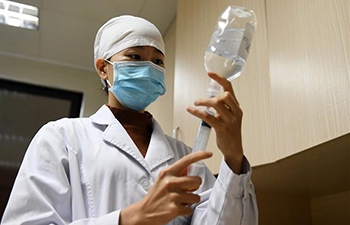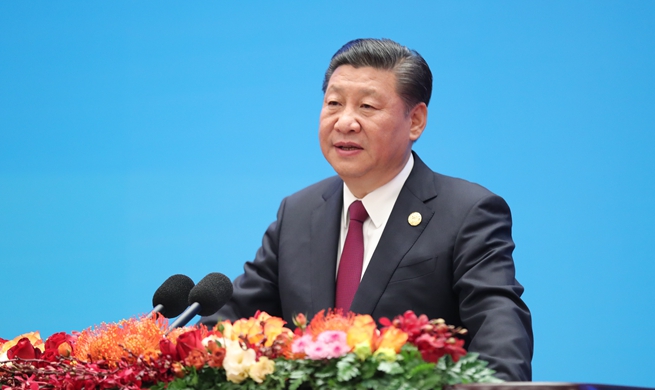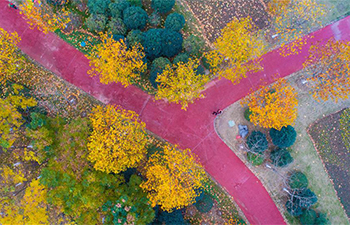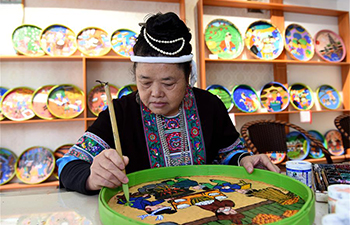by Zenzile Khoisan
CAPE TOWN, Dec. 1 (Xinhua) -- South Africans on Friday marked the World AIDS Day with a focus on cooperative strategies involving communities.
As part of nationwide commemorations, the Western Cape Province held its annual event in Delft, an economically depressed township in Cape Town's Cape Flats.
The township, which includes a very large informal settlement known as Blikkiesdorp, has been severely impacted by substance abuse with a high prevalence of HIV infections, drawing growing attention from civic organizations which call for more state resources to be committed to the area.
This holistic approach has been spearheaded by Nomafrench Mbombo, the Western Cape Provincial Minister for Health.
Mbombo told Xinhua that this year's event was designed to bring more men into the fight against HIV/AIDS.
He said there is a tendency among men who are reluctant to take proactive steps to prevent HIV infection or seek help for illness, thus compounding the health crisis.
For this reason, the provincial health department had responded to community calls for intervention by holding the 2017 World AIDS Day event under the theme "A wise man knows his status," according to Mbombo.
The theme served as part of a broader interactive and collaborative campaign which aims to get people widely and regularly tested for HIV, Mbombo said.
"Last year we held several activities to raise awareness about men and their health and to sound the alarm about early detection. It proved successful, which is why we are engaging men in the same way today. We are particularly aiming to reach out to those people who do not attend a health facility regularly," Mbombo said.
He said his department had chosen a collaborative approach, specifically in reaching out to men, encouraging them to take responsibility for their health.
Mbombo said the campaign was organized as a "health activation" to provide health services to men as well as women.
The campaign will encourage boys and girls, men and women to have an HIV test, regularly check their blood pressure, blood sugar and cholesterol levels, said Mbombo.
This kind of screening will help identify any potential illnesses that might occur before symptoms start to show, he said.
Through this type of testing, the myths associated with clinics and hospitals can be confronted without men having to go to a health facility, he added.
Official statistics released in October showed that the Western Cape Province has made outstanding achievements in its fight against HIV/AIDS.
More than 1.3 million HIV tests have been done this year, with 61 percent of those tested being female and 39 percent male. At the end of September 2017, a total of 244,195 people were receiving treatment for HIV, and in the 2016/17 financial year, the province recorded a 0.8 percent mother-to-child HIV transmission rate.
The province's proactive approach in confronting the pandemic also included the distribution of more than 113 million male condoms and more than three million female condoms.
The campaign also advocates lifestyle changes which include proper and regular medication use, avoiding high alcohol consumption and proper nutrition.
With more than seven million HIV/AIDS patients, South Africa has the highest prevalence of HIV/AIDS in the world. One third of all new infections in Africa last year were in South Africa.
The country is also recognized as one of the countries in the world with the largest treatment programs, under which more than 4 million people have been put on antiretroviral (ARV) treatment, largely funded by the South African government.
According to a recent report by UNAIDS, 36.7 million people globally are living with HIV, of which only 20.9 million are on ARV treatment.
Anti-AIDS activist Zelda Holtzman, a former deputy police commissioner for the Western Cape, told Xinhua that despite significant progress in the fight against AIDS it would be a mistake to be "lulled into a false sense of security."
"The fight against AIDS is very real, particularly for the most vulnerable, the poor and the working class, and the government needs to commit more resources to this fight, to ensure that all our people get the care they deserve," he said.
This will require a more focused approach to how the healthcare budget is distributed, as also as new approach to what our national priorities are, Holtzman added.

















